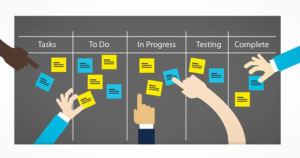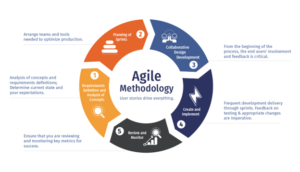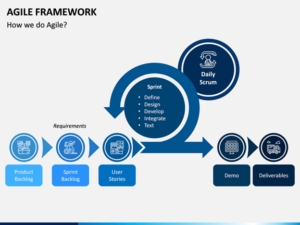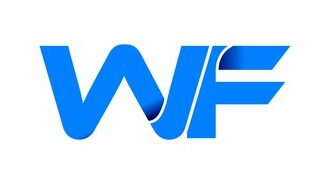With millions of apps available across various platforms, the competition is fierce, and user expectations are higher than ever. To stand out in this crowded marketplace, businesses shall strictly ensure that their apps are functional, responsive, and adaptive to user expectations and technological evolutions.
Since the traditional mobile app development approaches, such as the water model, went short of meeting rapid market changes and user needs. There was a solid gap in the market for an effective mythology that led to lengthy development cycles, inflexible planning, and a disconnect between developers and end-users.

This is where Agile methodologies shine; they have emerged as a vital framework for mobile app development, fostering collaboration, flexibility, and customer-centricity. As a result, many project managers manage to avoid delays, overcome budget overruns, and balance user dissatisfaction.
With an agile approach, they can break down projects into manageable increments to encourage feedback and adaptation. It helps the team to bring out a final product that perfectly satisfies user expectations and meets market trends.
Being a mobile app development company, understanding this approach will help you position yourself at the top and succeed in the tech industry. Read on to discover how this game-changing concept redefines mobile app development, as well as its benefits and challenges.

What is Agile Methodology?
At its core, Agile is all about iterative progress and adaptability. Instead of following a strict, linear path, Agile breaks projects into smaller pieces called sprints. Each sprint focuses on delivering a functional part of the product that allows mobile app development teams to adjust their approach based on feedback and any changes in requirements.
It implies that tech experts can pivot when necessary to ensure they are on the right. In the Agile manifesto, there are a few core principles which include:
- Individuals and interactions over processes and tools
- Working software over comprehensive documentation
- Customer collaboration over contract negotiation
- Responding to change by following a plan
Why Choose Agile for Mobile App Development?
1. Flexibility to Adapt
With ever-changing user requirements and tech advancement, the niche of mobile app development is popping up all the time. Those who work with an agile approach can easily adapt to these changes and yield results. Rather than a backbreaking task, everyone in the team is assumed to reassess priorities and make necessary changes based on requirements. This undoubtedly guarantees that the end product will stay relevant and meet high standards.
2. Better Collaboration & Communication
Agile promotes collaboration as a core value in development where everyone works closely. It suggests that the team should have regular meetings, sprint reviews, and retrospectives to encourage open dialogue among developers, designers, and stakeholders.
With this next-level transparency, they can identify potential roadblocks early on and keep everyone aligned toward shared goals for better results.
3. Putting Customers First
One of the standout features of Agile is its emphasis on customer feedback. By involving users throughout the development process—through user stories and testing prototypes—teams can gather insights that inform design and functionality. This focus on the user ensures that the final product meets and often exceeds expectations, leading to higher satisfaction and adoption rates.
4. Speeding Up Time to Market
Agile allows teams to roll out a Minimum Viable Product faster, which means businesses can enter the market sooner. This quick launch helps validate ideas with real users and gather feedback. Continuous iteration ensures teams can implement improvements and new features more rapidly than traditional methods would allow.
5. Delivering Higher Quality Apps
Quality is paramount in app development, and Agile methodologies support this by integrating testing throughout the process. Continuous testing means issues can be identified and resolved early, reducing the risk of significant problems later on. This proactive approach leads to higher-quality apps that are more reliable.

Popular Agile Frameworks
There are several Agile frameworks that can work wonders for experts in mobile app development, such as:
Scrum
Scrum is one of the most well-known Agile frameworks. It organizes teams into structured roles, such as the Product Owner, Scrum Master, and Development Team. With defined sprints and regular feedback loops, Scrum is perfect for mobile app projects where collaboration is key.
Kanban
Those who want to focus on visualizing work and optimizing the flow of tasks can use the Kanban board to track progress with transparency and efficiency. This approach is excellent for projects that need continuous delivery and frequent updates.
Extreme Programming
Extreme Programming takes the Agile approach to the next level by emphasizing technical excellence and steady progress. With practices like pair programming and test-driven development it can enhance your code quality and strengthen your team bond. This is especially useful in cases where complex mobile app projects require top-notch code.
Final Insights
An agile approach, to some extent, makes things easy for you all, whether you are a startup or a mobile app development company. We know nothing is ever; there is always room for improvement in everything we do. The same goes for this approach. It also has some flaws and challenges that might be tough to deal with, such as consistent communication, changing requirements, or stakeholder expectations.
We recommend you cultivate a culture of communication and encourage teamwork among development experts to make the most of agile. It will help you to develop impeccable apps that stand out in the market.
Dont let traditional working methods hold you back; adapt Agile into your development process now to lay a foundation for your next big success!

